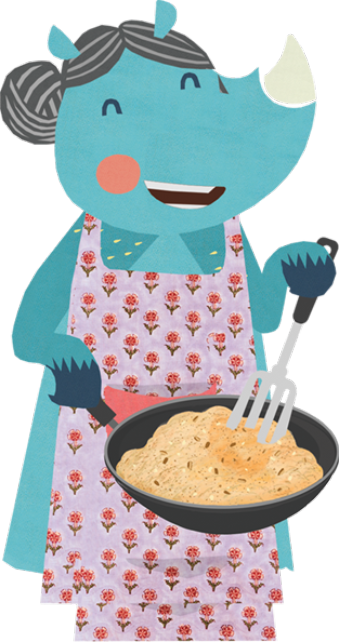Diarrhea is a common concern and can cause anxiety and discomfort for both babies and their caregivers. But once you know more about diarrhea – why it happens, what you should do for your baby, and how to try to prevent it – it will ease your worries and keep you alert and aware.
What Is Diarrhea?
In India, diarrhea is also known simply as “loose motions.” Diarrhea is characterized by frequent, watery bowel movements. There are mainly 3 types:
1) Acute watery diarrhea: This type has a sudden onset and typically lasts for a few hours. It is the most common form of diarrhea.
2) Acute bloody diarrhea (dysentery): This type also has a sudden onset, and blood is present in the stools
3) Persistent diarrhea: If diarrhea lasts for more than 14 days, it is classified as persistent diarrhea.
The Dangers of Diarrhea
During diarrhea, there is excessive loss of fluids and electrolytes through the stools. This can be particularly dangerous if the diarrhea is chronic or persistent, as it is the second leading cause of death among children under 5 years old worldwide. This information is not intended to stress you out further, but to make you aware that diarrhea in children should not be taken lightly especially if it is severe or repetitive.
Causes of Diarrhea in Babies
1) Viral or bacterial infections: The most common cause of diarrhea in infants is viral or bacterial infections, Viral infections occur through contaminated food, water, or poor hygiene. That’s why it’s best to follow strict hand washing hygiene by everyone who deals with your baby.
2) Improper washing of fruits and veggies: Certain fruits, like lemons, may carry harmful bacteria on their skin. Additionally, consuming raw or undercooked foods, including meats and seafood, can also cause diarrhea.
3) Food intolerance: Babies who are unable to digest lactose or gluten may experience loose motions.
4) Medication: Some medications, especially antibiotics, can disrupt the balance of gut bacteria and cause diarrhea.
5) Cow's milk protein allergy: This condition can also lead to recurrent diarrheal episodes. (Remember, this allergy is different from lactose intolerance.)
Common Symptoms of Diarrhea
1) Frequent and watery bowel movements: Some babies may pass soft stools twice or thrice a day, which may actually be their normal routine. However, if you observe your baby passing watery stools thrice a day (or more), that is an indication that they have diarrhea.
2) Increased fussiness: Obviously, babies will get irritable and cranky due to the gastrointestinal pain and discomfort
3) Reduced food intake and appetite: You may observe that babies are eating less or have no appetite when they’re suffering from any gastric discomfort.
4) Dehydration: Due to the excessive loss of fluid during loose motions, dehydration occurs. When babies get dehydrated, they may have these symptoms: dry mouth, chapped lips, few or no tears while crying, sunken eyes, and few or no wet diapers.
How Do You Help Your Baby Get Better?
While we cannot tackle diarrhea directly, we have to work on managing and treating its symptoms. In this case, dehydration is the major symptom and can be harmful for babies. Hence, the most important step is to increase hydration. Here are some ways how:
1) More breast/formula feeds: Increase the frequency of breast or formula feeds to help with mild to moderate dehydration. Avoid giving plain water, as it lacks the essential electrolytes.
2) ORS: If the baby has three or more loose stools in a day over several days, consider giving them oral rehydration solution (ORS). ORS is a mixture of water, salt, and sugar that replenishes lost electrolytes. You can buy ORS over the counter or you can make it at home (mix 6 tsp of sugar with ½ tsp of salt in 1 liter of water).
- Remember to not modify the amounts of sugar, salt, or water as this may worsen your baby’s symptoms.
- Children under 2 years old can be given 1/4th cup to ½ cup of ORS throughout the day (depending on the degree of dehydration). Please do not give more than ½ cup in a day.
- Avoid adding ORS to milk, juice, soft drinks, or soups. Also, avoid adding any extra sugar (apart from what was mentioned in the above recipe). It’s best to use only clean sterile water to make the ORS.
3) Gruels: Serve khichdi or pongal or millets/cereals cooked with water to increase hydration.
4) Rice kanji: Rice water is also an excellent option.
Tips to Remember
- Avoid giving any over-the-counter anti-diarrheal medications unless prescribed by your doctor.
- Be mindful of diaper rash as loose stools can irritate the baby's delicate skin. Use warm water to clean their buttocks during diaper changes and apply diaper rash cream after their skin has dried.
- Avoid giving juices or sweetened drinks, as the extra sugar can worsen diarrhea. There is no need to follow a specific diet during diarrhea, but focus on bringing your baby back to their regular diet as soon as possible.
- Please stick to prescribed quantities when using rehydration liquids like ORS and consult your doctor if you suspect food intolerance before eliminating any food category from your baby's diet.
- Probiotics can be beneficial in restoring gut flora and reducing the duration of diarrhea. Adding curd or yogurt to their diet or consulting your doctor for probiotic supplements is an option to consider.
- WHO recommends zinc supplementation for reducing the duration of diarrhea. Consult your doctor for appropriate guidance.
In the cases of persistent diarrhea (lasting for 14+ days), WHO recommends following a lactose-free diet for the baby. However, a lactose free diet can include curd or yogurt as these are beneficial for their gut. You could reduce breast or formula feed.
When to Seek Medical Attention
While most cases of diarrhea resolve within a day or two, seek medical attention if you notice the following signs in your baby after 24 hours:
- Dry mouth
- Decreased urination
- Lethargy
- High fever
- Persistent vomiting
- Abdominal pain or discomfort
- Diarrhea lasting for more than 24-48 hours
Tips for Preventing Diarrhea
1.Practice proper handwashing hygiene before and after handling your baby, preparing food, and during playtime.
2.Use only clean sterile water for your baby.
3.Thoroughly wash fruits and vegetables with clean water and ensure all food is fully cooked.
4.Breastfeeding offers protective antibodies and pre/probiotics to the baby, and this can help prevent diarrhea.
Your baby's health and well-being are of utmost importance, and with proper care, most cases of diarrhea can be managed successfully. Remember that if you have any concerns, it's always best to seek advice from your doctor or pediatrician.
Tomorrow, we will look at cold and cough in babies, when it may be a cause of concern, and how to manage the symptoms so your baby can get relief.


















